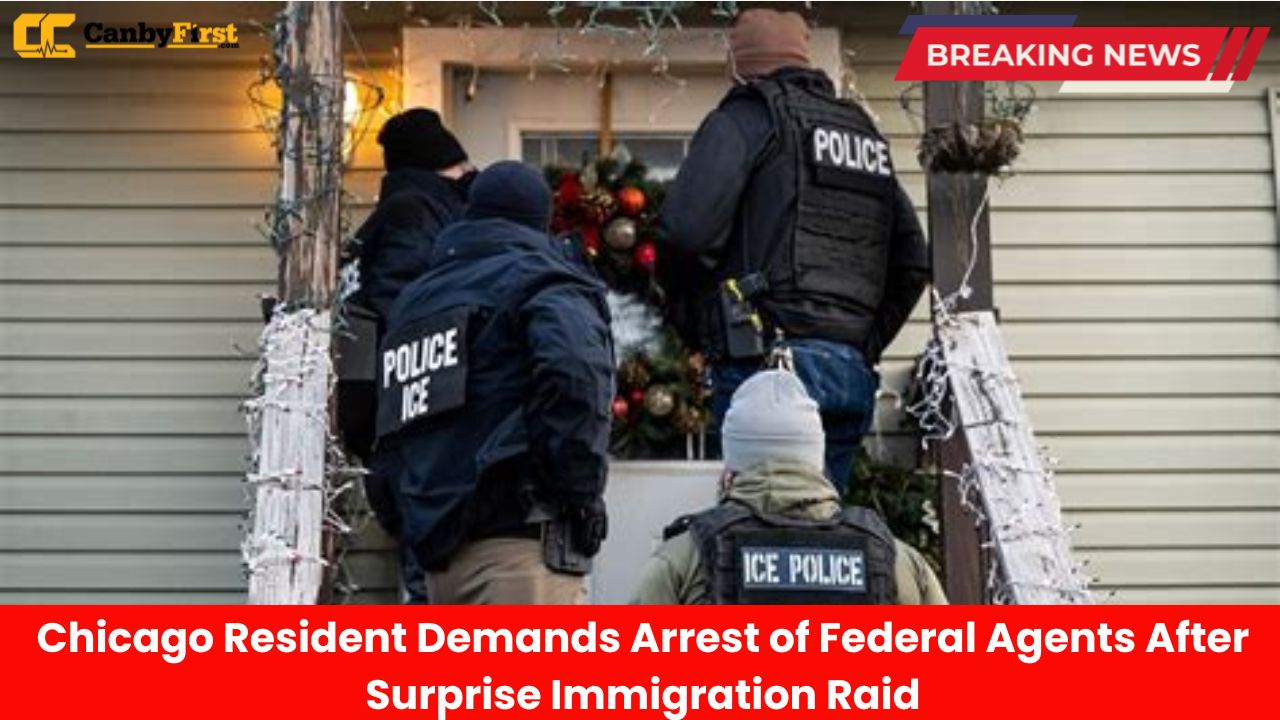Chicago, US: A Chicago homeowner created a stir on Saturday after publicly demanding that local police arrest federal immigration agents who carried out a surprise raid on his property, claiming the operation violated his rights and disrupted his family’s safety.
The man, identified as Martin Alvarez, a longtime resident of the city’s Brighton Park neighborhood, said the federal officers entered his property without proper warrants early Friday morning. According to Alvarez, several Immigration and Customs Enforcement (ICE) agents surrounded his house at dawn, detaining two individuals who had recently moved into a basement apartment on the property.
Resident’s Allegations
Speaking to neighbors and local media, Alvarez insisted the agents had no right to enter the premises without notifying him or presenting valid authorization. He recounted how his young children woke up frightened by the loud banging on the front door and the flashlight beams seen through the windows.
Also Read
“They came like it was a criminal raid,” Alvarez said during an impromptu press briefing outside his home. “They scared my family, broke my fence, and refused to show any paperwork. I called 911 because it felt like a home invasion, not an official operation.”
Alvarez has since filed a formal complaint with the Chicago Police Department (CPD), urging local officers to investigate the federal agents’ conduct. He argued that even federal officers must adhere to municipal laws and constitutional standards when acting within city limits.
Tense Community Response
The incident quickly drew attention across Chicago’s South Side, where immigration-related tensions have intensified in recent months. Neighbors gathered near Alvarez’s property following the raid, voicing support and frustration over what they see as invasive federal enforcement in residential areas.
Several immigrant rights organizations also condemned the operation. They called it an example of overreach by federal authorities and renewed their push for city leaders to strengthen Chicago’s sanctuary protections. The city has long maintained a policy of limited cooperation with federal immigration enforcement, but residents say incidents like this show the policy’s limits.
Local Police Caught in Middle
The Chicago Police Department confirmed that officers responded to a 911 call from the residence, but by the time they arrived, the federal agents had already left the scene. In an official statement, CPD said it is “reviewing the circumstances” and determining whether any city laws were violated during the federal operation.
Legal experts note that the situation presents a complex jurisdictional challenge. Under U.S. law, federal immigration agents possess certain powers to operate independently of local law enforcement, particularly when enforcing federal warrants. However, if no warrant is presented or if the agents enter private property without consent, they could face allegations of unlawful entry or misconduct.
Federal Agency’s Position
A spokesperson for ICE’s Chicago Field Office stated that the agency conducted a “targeted enforcement action” related to previous deportation orders. The statement added that the agents “acted in accordance with federal guidelines” and only detained individuals already flagged for removal.
When asked about the homeowner’s claims of property damage and lack of judicial authorization, the spokesperson declined to comment further, citing an ongoing internal review.
Political Repercussions
City officials have also joined the debate. Chicago City Council members from the South and West Sides expressed concern over federal tactics and demanded greater oversight of immigration-related enforcement within city neighborhoods. Some called for a review of communication protocols between federal and local authorities, while others suggested introducing new city ordinances requiring transparency prior to any federal operation.
Mayor Brandon Johnson issued a brief statement late Saturday acknowledging the controversy. “Our city remains committed to protecting all residents. No one should feel unsafe in their own home,” he said. “We will ensure that our law enforcement partners act responsibly and in line with constitutional values.”
Legal and Civil Rights Implications
Civil liberties advocates argue that the incident could serve as a legal test case for how far federal officers can go when entering private property in a sanctuary city. If the agents lacked a judicial warrant, as Alvarez claims, any evidence or arrests from the raid could be challenged in court.
Immigration attorney Melissa Huerta said such incidents highlight growing concerns about overlapping jurisdictions. “People have rights that apply regardless of their immigration status,” she explained. “If law enforcement—federal or local—violates those protections, courts must step in to uphold accountability.”
For Alvarez, the experience was personal and deeply unsettling. He maintains that he had rented part of his property lawfully and was unaware that two of his tenants were subject to immigration enforcement. “I’m not against the law,” he emphasized, “but I want the law to treat us fairly. My property is not a war zone.”
Community Support and Next Steps
Grassroots groups have organized a series of community meetings to discuss the raid’s impact and ensure residents understand their rights during future encounters with federal agents. Legal aid clinics have also offered free consultations to affected families.
As of Sunday evening, Alvarez said he plans to pursue legal action if his complaint does not lead to an investigation. “I want justice,” he stated. “Someone needs to answer for what happened on my property.”
The situation remains under review, and both the Chicago Police Department and ICE confirm that internal inquiries are ongoing. Meanwhile, the event has reignited debate over the balance between immigration enforcement, civil rights, and community trust in one of America’s most diverse cities.












